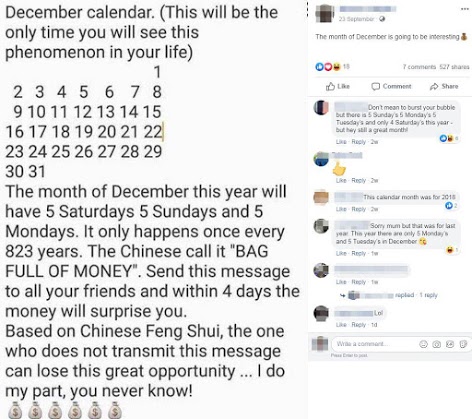The Statement
AAP FactCheck examined a Facebook post from September 23, 2019 by an Australian user showing the December calendar purportedly for this year.

The post reads: “December calendar. (This will be the only time you will see this phenomenon in your life)
1
2 3 4 5 6 7 8
9 10 11 12 13 14 15
16 17 18 19 20 21 22
23 24 25 26 27 28 29
30 31
The month of December this year will 5 Saturdays 5 Sundays and 5 Mondays. It only happens once every 823 years. The Chinese call it “BAG FULL OF MONEY”. Send this message to all your friends and within 4 days the money will surprise you. Based on Chinese Feng Shui, the one who does not transmit this message can lose this great opportunity … I do my part, you never know!”
The post has been shared more than 500 times and generated more than 15 reactions.
The Analysis
Variations of the December calendar post claiming different months containing days of the week with five-day combinations have been circulating on the internet and social media since at least 2010. This claimed “phenomenon” was debunked in 2011, 2012, 2015, 2017 and again in 2018.
The Facebook post’s claim that “December this year” has five Saturdays, Sundays and Mondays is not correct and relates to December 2018.
Dr Anand Deopurkar, a lecturer in algebra and research fellow at the Australian National University’s College of Science, told AAP FactCheck via email that while December 2019 does not have five Saturdays, Sundays, and Mondays, “it does have five Sundays, Mondays, and Tuesdays”.
“Take a month (with) 31 days, say December. It will always have three consecutive days that occur five times. In the next year, these three days will shift forward by one day because 365 when divided by seven leaves a remainder of one,” he said.
Dr Deopurkar says the sequence differs slightly during leap years.
“For leap years it will shift forward by two days. So next year (a leap year) in December we will have five Tuesdays, Wednesdays, and Thursdays.
“In 2021 (not a leap year), we will advance by one, and we will have five Wednesdays, Thursdays and Fridays, and so on. When we advance by seven, we (get) back to where we started.”

Dr Deopurkar told AAP FactCheck the same cycle of three days of the week occurring five times in a month usually restarts in five to six years.
“If we had no leap years, this number will always be seven, but because of leap years, it gets shortened somewhat because we advance by two in leap years,” he said. “In fact, the week configuration of the entire year repeats every five to six years. So any given configuration is actually not ‘that’ rare. If you saw a December with five Saturdays, Sundays and Mondays, you’ll see it again in five to six years. The number 823 is way off.”
A Sydney-based Chinese Feng Shui expert, Mina Zheng told AAP FactCheck that a month containing three days of the week occurring five times has nothing to do with a “bag full of money”.
Carol Olmstead, a US-based Feng Shui practitioner, author and speaker, commented on the claim in a blog, writing “while there is a ‘money bag’ symbol in ancient Chinese Feng Shui, it certainly doesn’t involve forwarding emails”.
“It’s not Feng Shui … and forwarding the email won’t make you wealthy … (it’s) just another email hoax … the ancient Feng Shui masters never used chain letters to bring luck.
“In the Chinese culture, the Happiness Buddha carries the ‘money bag’ sack over his shoulder and goes around handing out gifts. That’s why you often see the statues or images of the Happiness Buddha in Asian restaurants and businesses.”
Ms Zheng also told AAP FactCheck the post’s statement that in “Chinese Feng Shui, the one who does not transmit this message can lose this great opportunity” was “a scam”. She said Feng Shui was based on the concept of “energy from the natural environment”.
The Verdict
Based on the evidence, AAP FactCheck found the Facebook post to be false. December 2019 does not have five Saturdays, five Sundays and five Mondays. This sequence happens in every month with 31 days and does not occur every 823 years.
- False – The primary claim of the content is factually inaccurate.
First published October 10, 2019, 17:55 AEST

















